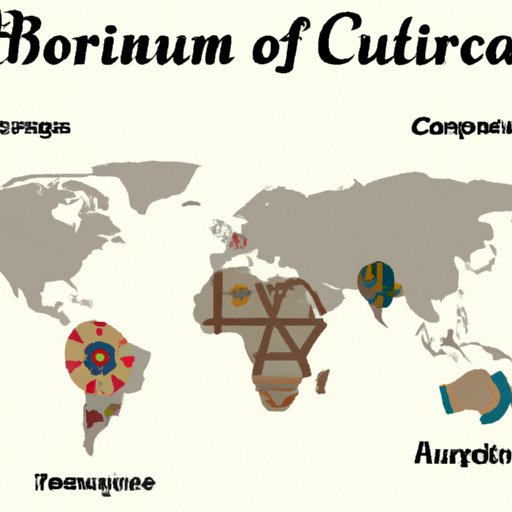Introduction
Culture is a term that has been used for centuries to describe a set of shared beliefs, values, customs, behaviors, and symbols that make up a group or society. It’s often referred to as “the way of life” or “the way things are done” in a particular community or nation. Culture is a complex concept that encompasses many aspects of life, such as language, art, music, literature, history, philosophy, cuisine, and more. In this article, we will explore the definition of culture, different types of cultures around the world, how to use culture to enhance your life, and much more.
Exploring the Definition of Culture: What Does It Mean?
At its core, culture is a set of shared values, beliefs, and practices that are passed down from generation to generation. It is a way of life that shapes how people think, act, and interact with one another. Culture is not static; it is constantly changing and evolving over time. It is influenced by a variety of factors, such as geography, history, politics, religion, and even technology.
The definition of culture can be broken down into two parts: material culture and non-material culture. Material culture includes physical objects, such as tools, clothing, and other artifacts. Non-material culture, on the other hand, refers to intangible aspects of culture, such as language, beliefs, values, and customs.

Examining the Different Types of Cultures Around the World
There are many different types of cultures around the world. Some of the most common types of cultures include religious cultures, ethnic cultures, national cultures, and regional cultures. Religious cultures are based on shared beliefs and practices related to a specific religion, such as Christianity, Islam, Hinduism, and Buddhism. Ethnic cultures are based on shared ancestry, language, and traditions, such as Native American, Asian, African, and Latin American cultures. National cultures refer to the shared values, beliefs, and customs of a specific nation, such as French, German, and British cultures. Finally, regional cultures are based on shared geographic features, such as mountain, desert, and coastal cultures.
It’s important to note that there is no single “right” way to identify a culture. Every culture is unique and has its own set of characteristics. When trying to identify a culture, it’s best to look at all of the elements that make up a culture—language, beliefs, values, customs, and more—to get a better understanding of what makes it unique.
How to Use Culture to Enhance Your Life
Understanding and appreciating different cultures can have a positive impact on your life. Learning about different cultures can help you gain a greater appreciation and respect for people who are different from you. It can also help you understand why people act and think the way they do. Finally, understanding different cultures can help you become a more open-minded and tolerant person.
Another way to use culture to enhance your life is to incorporate aspects of different cultures into your daily life. For example, you could learn a new language, try a new type of cuisine, or practice a new dance style. Exploring different cultures can open you up to new experiences and perspectives, and help you become a more well-rounded individual.

Understanding the Influence of Culture on Society
Culture has a profound influence on society. It shapes our values, beliefs, and behaviors, which in turn shape our societies. For example, cultural values such as respect for elders or loyalty to family can shape how people interact with one another. Cultural beliefs such as the importance of education or the value of hard work can shape how people view success. And cultural behaviors such as giving gifts or greeting someone with a handshake can shape how people interact with one another.
Culture also influences how we view the world. Our cultural backgrounds shape our worldviews and the way we interpret events. For example, people from different cultural backgrounds may have different views on topics such as politics, religion, or social issues. Understanding and appreciating these differences can help us build bridges between cultures and create a more harmonious society.
Exploring the Impact of Cultural Diversity
Cultural diversity is defined as the presence of multiple cultures within a given society. It can refer to different ethnic groups, languages, religions, and other cultural identities. Cultural diversity is beneficial because it allows for different perspectives, ideas, and solutions to be explored. It also helps promote tolerance and respect for different cultures and encourages people to learn from one another.
Cultural diversity can also bring economic benefits. It can lead to increased productivity and creativity, as well as new business opportunities. Additionally, it can help attract tourists and boost a country’s economy. Finally, cultural diversity can help strengthen a society’s sense of identity and pride.
Investigating the Role of Technology in Shaping Culture
Technology has had a major impact on culture. From communication technologies such as the telephone and the internet to transportation technologies such as cars and airplanes, technology has made it easier for people to connect with each other and travel around the world. This has led to an increase in cultural exchange and a greater appreciation for different cultures.
Technology has also changed the way people interact with each other. Social media platforms such as Facebook and Twitter have enabled people to share their opinions and connect with others around the world. This has led to a greater awareness of global issues and an increased ability to share ideas and collaborate across cultures.

Analyzing the Relationship Between Culture and Religion
Religion is often closely intertwined with culture. For example, many cultures have religious rituals associated with important events such as weddings, funerals, and holidays. Additionally, religious beliefs often shape people’s values, morals, and behavior. Finally, religious organizations can provide a sense of community and connection for people of similar faiths.
It’s important to remember that religion does not define a culture; rather, it is one of many influences on a culture. Different religious beliefs can coexist within the same culture, and the same religion can manifest itself differently in different cultures. Understanding and respecting the relationship between religion and culture can help us foster an environment of tolerance and understanding.
Conclusion
In conclusion, culture is an incredibly complex concept that encompasses many aspects of life. We explored the definition of culture, different types of cultures around the world, how to use culture to enhance your life, and the impact of culture on society. We also looked at the role of technology in shaping culture and the relationship between culture and religion. Ultimately, understanding and appreciating different cultures can help us build bridges between cultures and create a more harmonious society.
(Note: Is this article not meeting your expectations? Do you have knowledge or insights to share? Unlock new opportunities and expand your reach by joining our authors team. Click Registration to join us and share your expertise with our readers.)
